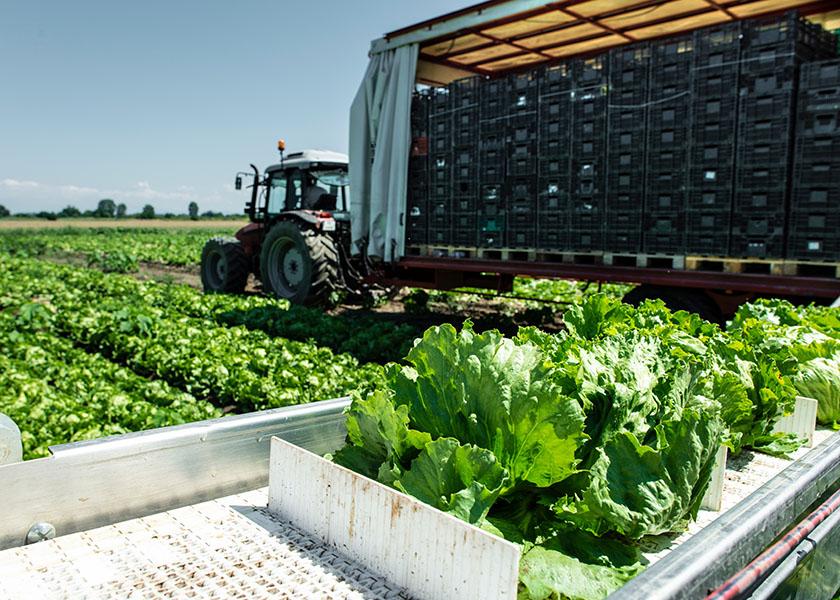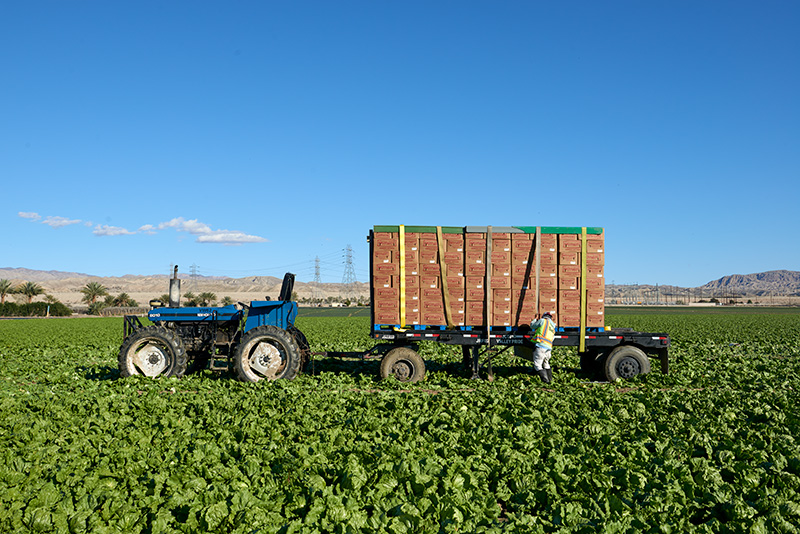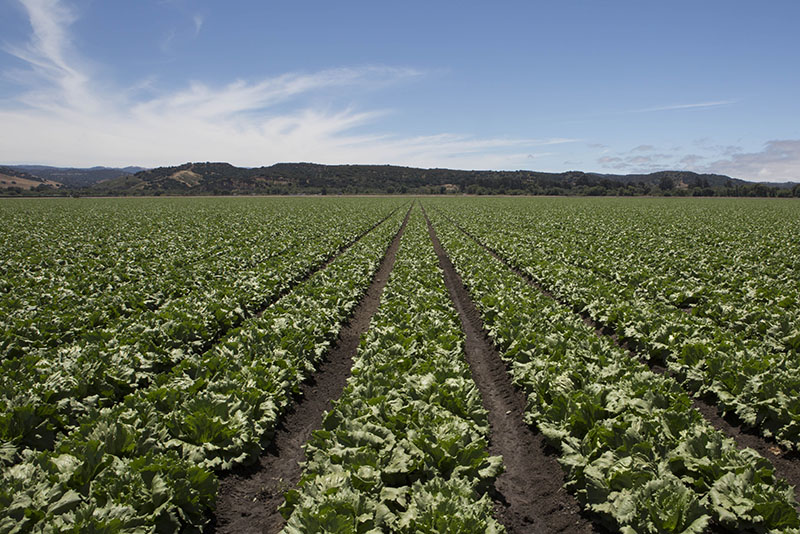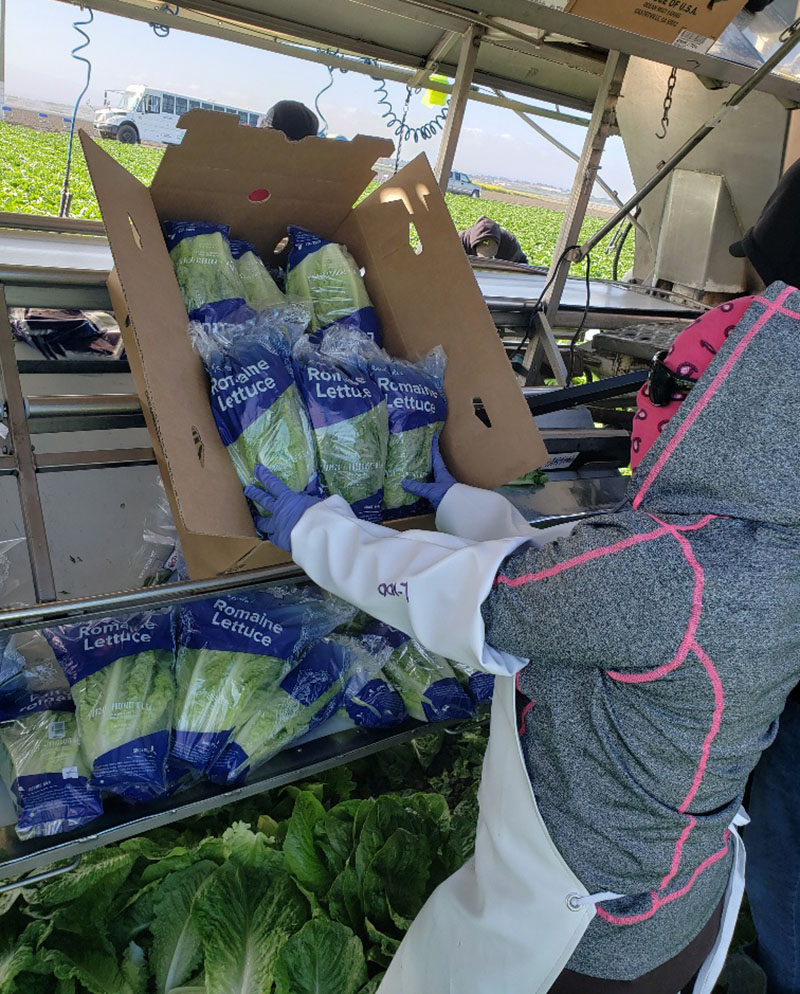Picking up the pieces: California lettuce and leafy greens stabilize after rocky spring

Markets and crop harvests are finally normalizing across the supply chain after the California climate brought challenges to lettuce and leafy greens growers in the first half of 2023.
“The climate this year really threw us a curveball, and it's been it's been difficult to spring back from, but we will,” Mary Zischke, Impatiens Necrotic Spot Virus (INSV) and soil-borne diseases task force coordinator for the Grower-Shipper Association of Central California, told The Packer. “We've got the right location, climate and set of circumstances that this industry has always relied on to be the primary producer of leafy greens. I don't think that's going to change in the long term.”
The one silver lining to the early season rain, flooding and cool temperatures in Central California has been a reduction in disease pressure, Zischke said.
“We were faced with all these weather-related problems this year — flooding and ground that wasn't drying out,” she said. “Planting schedules just got thrown completely off kilter this year, and that just ripples through a season.
“We've seen a lot of ups and downs in markets this year because the supply hasn't been as reliable as usual due to our cold, wet winter that has just really thrown a monkey wrench,” she continued. “But things are back on track.”
Tiffany Stornetta, strategy manager for leafy greens and salad for meal kit company Hello Fresh, echoed Zischke’s assessment. Weather issues plagued leafy greens coming out of Salinas Valley in the first half of the year, causing compounding quality issues and gaps in supply until as recently as June, she told The Packer.
But Stornetta remains optimistic for the weeks ahead.
“It's finally feeling like the doldrums of summer are here and most of the markets are stabilizing, which feels good,” she said.

How markets survived California’s wet winter and cool spring
One advantage to the meal kit and delivery service model is that buyers were able to pivot and navigate tricky markets this spring by making meal kit menu adjustments, Stornetta said.
“We have a unique situation where we are pushing produce out to our consumers and they're not going to the shelf and picking and choosing. Our culinary team creates our recipes and meals,” she said. “There are times of the year where we'll anticipate supply gaps. We'll work with our culinary team to make sure that we're not putting something on the menu that is going to go through a supply gap.”
This means that, unlike most retailers, when markets skyrocket, the meal kit and delivery service can pivot and adjust menus accordingly. But this innovative model brings new challenges.
“What we buy is pretty unique,” Stornetta said. “We buy, basically, anywhere from a 2-5 ounce bag of spinach. They're meant to be consumed by two to four people — it’s a unique pack size, not something that you would see in the retail space or in foodservice.”
Because the company is shipping packaged product directly to a customer’s doorsteps to be cooked at home, conventional assumptions about the supply chain’s last mile don’t always match the Hello Fresh model.
“It presents its challenge — its own set of challenges, right? It's a small bag of leafy greens and we're putting it through the mail,” Stornetta said. “That means we really put a high priority on making sure that the quality going into the bag is right for our business model, and we set ourselves up and our suppliers up for success going through our supply chain.”
For producers, inflationary pressures layer on an additional hurdle to delivering high-quality, affordable greens to shelf.
“Like most other growers, recent inflation pressures have increased the cost to grow leafy greens,” John Georgalos, Ocean Mist Farms sales commodity manager, told The Packer. “Land, water, fertilizer, fuel, seed, etc. have all been affected. As a result, we’ve taken a detailed look at our expected needs and right-sized our program to match those needs. We continue to seek ways to farm and operate more efficiently and sustainably to minimize the impact of inflation on our customers.”
Despite myriad weather challenges, markets have been favorable overall for the grower.
“We’ve had a couple of windows in March and then in late May and June when supply exceeded market demand, causing markets to fall below cost,” Georgalos said. “But all in all, we’ve had a very good year so far.”

Unprecedented weather jostles business as usual
“As an industry, we rely on historic weather patterns to determine when we’re going to plant, which seed variety use [and so on]. When this changes, it disrupts the normal flow of supply,” Georgalos said.
This unprecedented weather caused a ripple effect in planting schedules.
“This year has been the most challenging in recent memory [for weather],” he said. “Extreme winter weather altered planting schedules and delayed harvest by up to three weeks, and periods of nonstop rain were followed by flooding.”
Crops were planted late and experienced wetter, colder weather than normal in the spring months, he said.
“Many leafy green crops tended to be bunched, causing some gaps and periods of oversupply,” Georgalos added. “The first crops planted were affected the most. By the time the second planting went in, weather had normalized, bringing more consistent supplies.”
Diversifying growing regions to reduce risk
Unpredictable weather patterns such as these have underscored the advantage of having diverse growing regions available. For some growers, that means looking outside of California.
“Foxy Organic produce is now being shipped out of the Walker River Cooling Facility in Yerington, Nev. This area produces the best organic quality in the country from late May to the middle of October,” John Amaral, sales manager for The Nunes Co., told The Packer. “Also, the location in Nevada brings the product closer to the customers, easily saving a day and a half in transportation time with carriers not having to come into California, saving 600 miles. This gives our customers fresher product with less shrink.”
It's not just growers. Retailers are starting to ask questions and make sure they have a one or more contingency plans ready in the event of unforeseen weather.
“What we've had to do is to really make sure that, as we're [lining up our] supply for leafy greens, we're diversifying our growing regions,” said Hello Fresh’s Stornetta.
Having weathered the California weather patterns over the last two seasons, Stornetta said it’s critical to discuss risk strategy with her suppliers.
“We're making sure not only that we're diversifying our growing regions [that we buy from], but also that our suppliers have some sort of contingency planning built into their model,” she said. “We don’t want to see high risk in their plans, and we don’t want to see high risk in our plans. We're very much focusing on making sure that we've got multiple growing regions going at the same time.”
Growers regain normalcy after a rocky spring
Cultivating iceberg lettuce, romaine and green, red and butter lettuce varieties, Ocean Mist Farms has had luck navigating the tricky weather patterns earlier this year largely due to its vertically integrated supply chain.
“Ocean Mist Farms is fortunate in that we own much of the land we farm, and our in-house team manages the farming and harvest operations,” Georgalos said. “We’ve been able to minimize major supply impacts by working together to coordinate harvests and proactively manage any swings in supply. We’re also constantly trying to match our available supplies with the needs of our customers and keeping our customers up to speed with our supply forecasts. This has been a very successful model this year.”

The Nunes Co., home of Foxy Fresh Produce, was able to leverage its diversified supply chain to maintain close to normal volumes.
“A good land base up and down the Salinas Valley provides flexibility when navigating any weather-related challenges,” Amaral said.
The grower produces organic and conventional lettuce greens along with chard, spinach, kale, cabbage and collard greens. While it didn’t experience supply gaps, the cooler temperatures and weather caused a delay earlier in the year, though it’s back on track with “summertime volume and good quality.”
“Weather conditions made it much more difficult [than in 2022],” Amaral said.
Over the last three to four months, the unfavorable weather, an unseasonably cool June in the Salinas Valley and persistent fog have affected production, he said.
In addition, Amaral saw an increase in demand due to supply shortfalls coming out of regions that faced adverse weather conditions, such as extreme heat in Mexico.
Setting sights on the summer months ahead
Georgalos of Ocean Mist Farms is expecting strong quality coming out of fields but likely lighter-than-average harvests through July.
“Below-normal temps during the last five weeks are starting to have an effect,” Georgalos said. “We see industry volume trending downward at a time when production is normally very high.”
The grower experienced slight delays earlier this season in Castroville, Calif., due to heavy winter rains, but things have been steady since the fields matured, he said.
Despite challenges, Stornetta at Hello Fresh is excited about the salad category this year.
“We have quite a few new recipes on the menu. We'll see how those play out over the next couple of months, and I’m looking forward to expanding our salad options,” she said.
In addition to buying bags of spinach, along with arugula and spring mix blends, Stornetta said she’s enthusiastic about the recent addition of baby romaine to meal kits.
“We take baby romaine and pack it into a single bag [that’s] dropped into our kits. It's a perfect size for a two- to four-person meal,” she said. “There's a variety of things that our culinary team loves to play with; we use it in salads, we use it as a lettuce wrap or cup. It's a wonderful size for us. It's just this little, tiny head of romaine. It's nice and compact and you get a lot of use out of a small footprint.”







